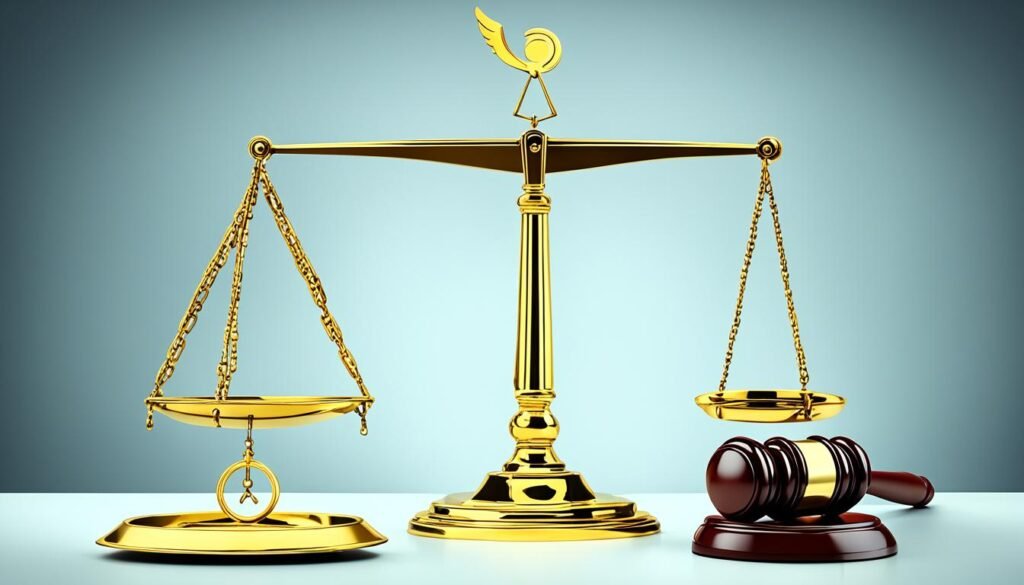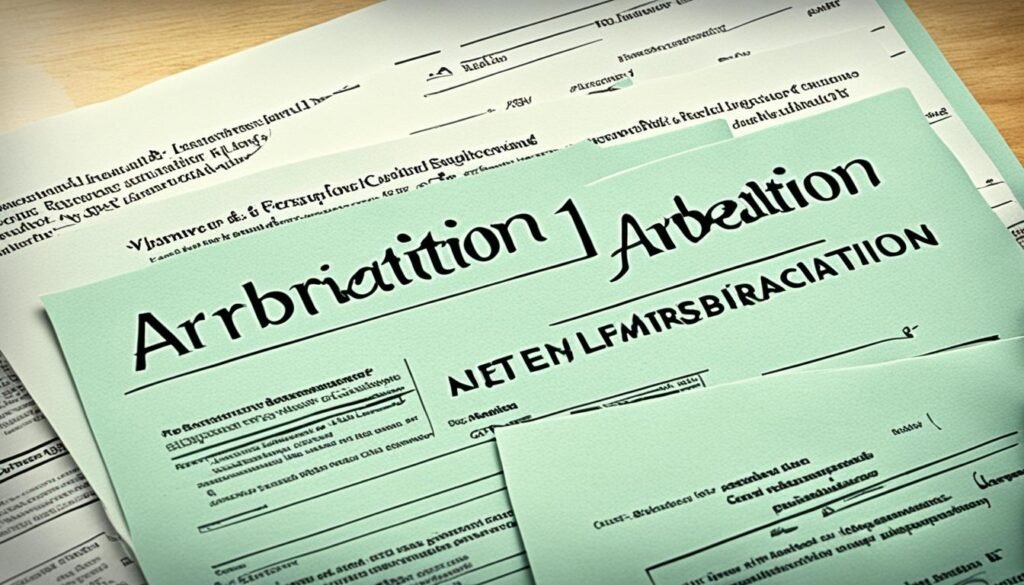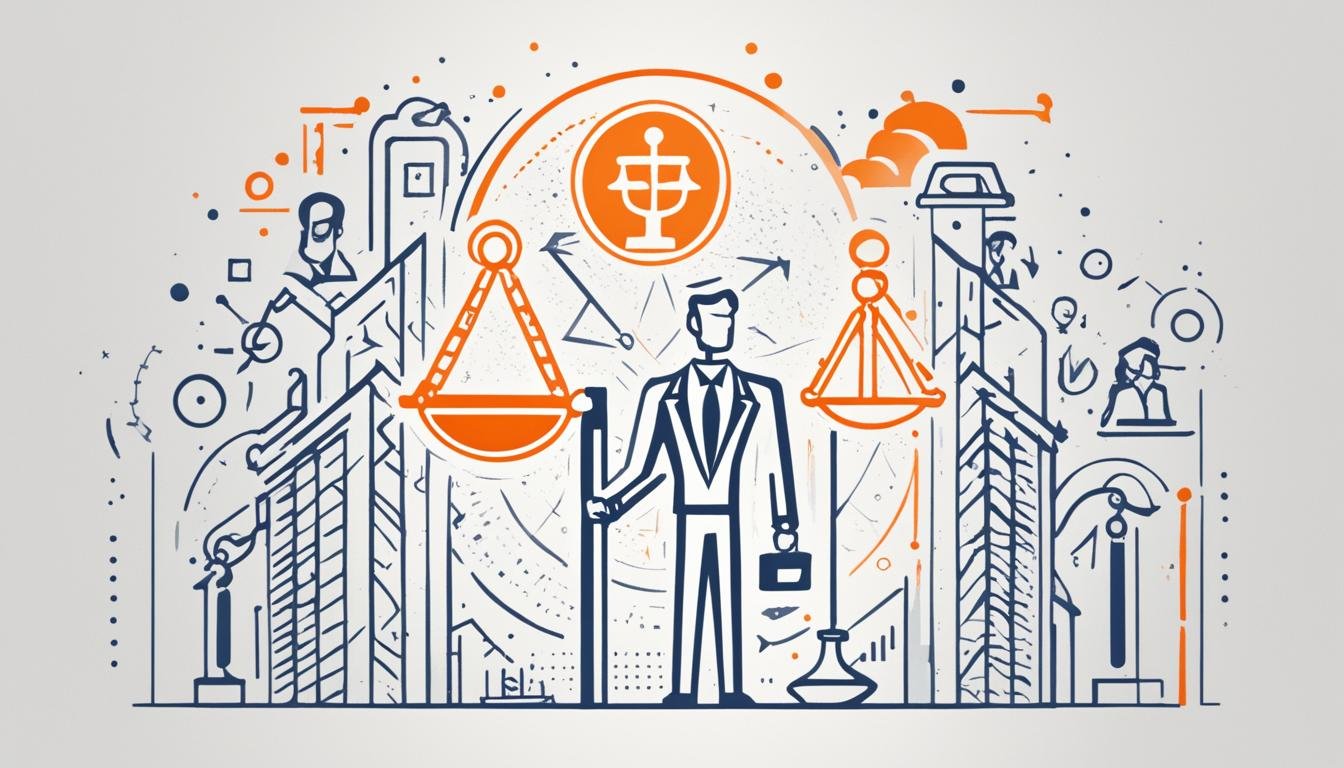Did you know litigation can hurt your business’s workflow and output? Litigation is complex and takes a lot of time. It can deeply affect your company. At Super Attorneys Of Irvine, we focus on fast and affordable solutions for business disputes. Our Orange County business litigation services aim to reduce the trouble legal issues can cause. This lets you concentrate on what’s most important – running your business.
Key Takeaways:
- Business litigation can disrupt operations and productivity.
- Super Attorneys Of Irvine specializes in swift and cost-effective resolution of business disputes.
- Our Orange County business litigation services help you minimize the impact of legal issues on your company.
The Benefits of Business Litigation
Handling legal matters is vital for a business’s success and steadiness. Businesses face issues like contract, employment, and owner disputes. Business litigation gives a formal way to solve these problems.
Business litigation helps by offering a clear process to settle disputes. It ensures contracts are followed and actions are accountable. This is crucial for fairness.
It also lets businesses ask for money they’ve lost. When agreements are broken or rights are ignored, they can get repayment through litigation.
Plus, litigation can protect against unfair competition or broken contracts. It lets companies protect themselves and stop damage.
“Business litigation provides a structured and regulated mechanism for resolving disputes, enforcing contracts, and seeking compensation for damages.”
Business litigation allows companies to deal with complicated legal issues and protect their rights. It’s a choice that helps address many disputes. This ensures fair outcomes that serve a business’s interests.
Choosing Between Arbitration and Litigation
Businesses facing legal issues can choose arbitration or litigation. Arbitration is a private process, often quicker and more flexible than litigation. It offers secrecy, expert arbitrators, and flexible procedures. Meanwhile, litigation means going through the courts, benefiting from legal rules, detailed evidence gathering, and the right to appeal. Choosing depends on the dispute’s nature, how fast you want a resolution, costs, and privacy needs.
In arbitration, disputes go to an arbitrator or a panel. This method can resolve matters faster than the court system, which might take longer due to its busy schedule. Arbitration lets you pick convenient hearing dates. It also keeps things private for all involved.
Arbitration shines when handling complex or technical disputes. Arbitrators’ expertise means they understand the issues deeply, leading to informed decisions.
Launching a lawsuit involves officially complaining in court, then moving through legal stages toward a trial and possibly a judgment. Courts offer a set, proven process with strict rules. Litigation lets you use past legal decisions to your advantage, shaping your case’s outcome.
The detailed evidence collection in litigation lets parties examine witnesses and hold depositions. This deep dive can clarify the dispute’s details. Having the chance to appeal means decisions can be reviewed, possibly changed.
Choosing between arbitration and litigation weighs on several aspects. Concerns over sensitive info or a wish for privacy might tilt the scale towards arbitration. How quickly you want to settle the matter matters too, as arbitration is typically faster. Costs can sway the decision; arbitration might be cheaper in some cases. Privacy issues also make arbitration appealing.
Factors influencing the choice between arbitration and litigation:
- Nature of the dispute
- Desired speed of resolution
- Cost considerations
- Privacy concerns
Thinking through these points, businesses can choose the best dispute resolution method. Whether arbitration or litigation, advice from legal pros, like Super Attorneys Of Irvine, helps in dealing with legal challenges.
| Arbitration | Litigation |
|---|---|
| Faster and more flexible | Structured court process |
| Confidentiality | Legal precedents |
| Expertise of arbitrators | Formal discovery process |
| Flexibility in procedural matters | Appeal rights |

The Advantages of Arbitration
Arbitration has big perks for solving legal issues. It provides confidentiality, so sensitive info stays protected. Unlike court cases that are open to the public, arbitration keeps things private. This is great for companies wanting to keep their matters secret.
Arbitration is also quick and efficient. It’s faster than the often slow court system. With less formal processes, it speeds up the resolution. This lets businesses get back to work faster, avoiding long court delays.
Choosing an expert arbitrator is another plus. Parties can pick someone who knows the field well. This means decisions are informed by deep industry knowledge. It makes the arbitration outcome more trusted and fair.
Flexibility in arbitration is a big advantage. Parties can set the rules and timeline to fit their needs. They choose the arbitrator and how things are done, making the process fit their unique situation. This flexibility leads to fairness and satisfaction with the outcome.
In summary, arbitration stands out for its confidentiality, speed and efficiency, skilled arbitrators, and adaptability. These factors make it a preferred choice over court for businesses wanting a tailored and quick dispute solution.

The Benefits of Litigation
Litigation brings many benefits when solving legal issues. Courts use legal precedents to ensure fairness and help build jurisprudence. The formal discovery process enables a deep dive into evidence, leading to smarter decisions. Furthermore, litigants can appeal decisions, opening the door for outcome reviews.
The litigation process is structured to offer these advantages. Decisions rely on legal precedents, making outcomes consistent and predictable. This process also ensures that rulings are open for all to see. It lays the groundwork for future legal cases.
Through the formal discovery process, parties exchange important information. This step ensures all evidence is carefully looked at. It helps everyone understand the case better, leading to fair and well-informed judgments.
The chance to appeal decisions is crucial in litigation. It lets litigants ask for a second look at decisions, potentially changing the result. This feature adds an extra layer of examination, aiming for justice.
In conclusion, choosing litigation has many perks for handling legal issues. It relies on legal precedents, a detailed discovery process, and the option to appeal decisions. Together, these factors make litigation a transparent and equitable approach.
Benefits of Litigation
| Benefits | Description |
|---|---|
| Guidance from Legal Precedents | Court rulings are guided by established legal precedents, ensuring transparency and contributing to jurisprudence. |
| Comprehensive Evidence Examination | The formal discovery process allows for a thorough examination of evidence, leading to more informed judgments. |
| Appeal Rights | Parties have the option to appeal decisions, allowing for reassessment and potential revised outcomes. |
Choosing Between Arbitration and Litigation
Choosing between arbitration and litigation depends on many important factors. The type of dispute matters a lot. Some disputes might suit arbitration or litigation better because of their detail, subject, and legal points.
Arbitration is often faster and less expensive. It skips the complex steps of court trials. But, the cost of arbitration can change based on the case’s complexity and the arbitrator’s fees.
Privacy is another key factor in making your choice. Arbitration keeps things more private, which could be crucial for some disputes. Litigation, however, is open to everyone and results in public records.
Deciding between arbitration and litigation also means thinking about how quickly you want a resolution. Arbitration is usually faster than going to court, which can face delays and scheduling issues. Arbitration might be the quickest way to solve your problem.
The costs involved also play a big role in the decision. Arbitration might save you money on legal fees and other expenses, but it varies with each case. Litigation might cost more at the start, but it has a clear set of rules for legal disputes.
In the end, choosing between arbitration and litigation needs careful thought. Think about the dispute’s nature, how fast you need a solution, costs, and privacy. Talking with legal experts can help you find the best way to solve your dispute.
The Importance of Privacy Concerns
Privacy concerns may influence your choice between arbitration and litigation. Arbitration proceedings are generally confidential, providing a level of privacy that may be important for certain disputes.
The Power of Mediation
Mediation is a great way to solve disagreements differently from court battles. It lets you have more say in the result. This way, both sides can agree on something that helps everyone.
With mediation, you’re not just watching from the sidelines. You get to help make the decision that works best for you. This leads to better outcomes and keeps everyone talking.
“Mediation allows disputing parties to take control of the outcome and work towards a solution that meets their unique interests and concerns.”
Mediation is also quicker and cheaper than going to court. You avoid long trials, lots of paperwork, and high legal fees. This speeds up the process and saves money.
It also offers creative solutions that courts might not think of. This makes sure the deal fits what everyone needs and wants.
Now, we can even do mediation online with tools like Zoom. This means you don’t have to meet in person, which saves time and is more flexible.
The Benefits of Mediation:
- Control over the outcome
- Efficiency
- Time and money savings
- Flexibility
Conclusion
When resolving legal issues, choosing between mediation and litigation is tricky. The choice depends on the dispute nature, resolution speed, cost, and privacy.
While litigation guarantees a legal judgment backed by precedents with a formal process and appeal rights, it’s more rigid. On the flip side, mediation offers flexibility, letting you control the outcome more. It’s efficient and saves money.
Parties directly shape the final agreement through mediation. This way, the solution fits their unique needs well.
By working with Super Attorneys Of Irvine, companies can navigate risks smartly. They offer solutions that match specific management needs. Whether through mediation or litigation, the goal is a fast and fair resolution.

